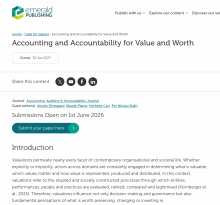Accounting and Accountability for Value and Worth

Valuations permeate nearly every facet of contemporary organisational and societal life. Whether explicitly or implicitly, actors across domains are constantly engaged in determining what is valuable, which values matter and how value is represented, produced and distributed. In this context, valuations refer to the situated and socially constructed processes through which entities, performances, people and practices are evaluated, ranked, compared and legitimised (Kornberger et al., 2015). Therefore, valuations influence not only decision-making and governance but also fundamental perceptions of what is worth preserving, changing or investing in.
In today’s world – marked by environmental crises, geopolitical conflicts, inflationary pressures and rising inequality – questions of how to account for value and worth have gained renewed urgency. Studies have, for instance, demonstrated that commensuration enables engaging with accounting to organise during crises (Crvelin & Löhlein, 2022). Accounting, with its calculative and representational accountability tools, is often positioned at the centre of valuation processes (Callon et al., 2007). Whether determining the worth of a public service (Fırtın, 2023), the value of human life (Jeacle, 2022, 2023), or trading prices (Svetlova, 2018), accounting plays a critical role. Yet accounting is not merely a neutral reflector of pre-existing values, as it also actively shapes, constructs and contests valuations (Annisette et al., 2017).
This special issue invites contributions that explore how accounting practices intersect with, and contribute to, broader societal and organisational valuation processes. Our aim is to further the development of a critical and interdisciplinary research agenda that places questions of value and worth at the core of accounting scholarship. What is at stake is not just how valuations are made, but also who makes them, under what conditions and with what consequences.
Valuation studies have a rich tradition, particularly within sociology and science and technology studies. Drawing on pragmatist thought, Dewey (1939) emphasised valuation as a situated practice embedded in everyday life. Boltanski and Thévenot’s (1991/2006) work on orders of worth highlighted the moral and pluralistic nature of evaluation, while Espeland and Stevens (1998) drew attention to commensuration as a powerful social process of rendering things comparable. Accounting has become increasingly central to such studies due to its pivotal role in producing calculative regimes, performance indicators, audit trails and representations of accountability.
Recent work has illuminated how these valuation processes play out in varied settings. Scholars have explored how accounting influences the valuation of art (Plante et al., 2021), research quality (Bedford et al., 2023) and cultural heritage (Apostol et al., 2023) as well as how valuations shape intra-organisational performance measures (Carrington & Alander, 2022), standards in financial reporting (Cortese & Andrew, 2020; Vesty et al., 2018) and profit accountability (Casarin, 2023). Further, studies of the intricacies between valuation and accounting have discovered how valuations account for risks (Huault & Rainelli-Weiss, 2011), sustainability (Carver, 2023), investments (Andersen & Tekula, 2022) and nourishment (Ransom, 2021). These studies underscore the performative power of accounting, not just in constructing value but also in enabling, legitimising, or resisting specific outcomes (Annisette & Richardson, 2011).
Nonetheless, substantial gaps remain. Svetlova (2018), for example, urged scholars to move beyond artefacts and numbers to analyse the social relationships and moral frameworks that underpin valuations. A lack of conceptual integration persists – similar processes are often described with different terminologies, and the potential synergies across theoretical perspectives remains underdevelopped. Method-wise, new approaches such as netnography open opportunities to capture valuation practices within and across online communities (Bialecki et al., 2017). At the same time, methodological choices shape the extent to which the human experience is rendered visible, and questions of value and worth are rich arenas to examine how accounting impacts social life. These gaps signal the need for more integrative, theoretically and methodologically ambitious studies.
This special issue seeks to advance empirical, theoretical and methodological insights into the interconnections between accounting, valuation and value in uncertain times. We especially invite studies that go beyond traditional conceptions of accounting as a passive recording tool and instead interrogate how accounting contributes to the (re)production of value systems. Multi-level and interdisciplinary analyses that link micro-level practices to organisational and macro-level transformations are particularly encouraged.
We welcome studies that illuminate how accounting acts as a valuation device and a site where notions of value and worth are negotiated and contested. What happens when accounting becomes a valuation-producing machine (Crepaz et al., 2016)? How do valuations shape, and get shaped by, notions of accountability? How do accounting technologies and professionals participate in constructing regimes of value and worth? What are the audit challenges when it regards value and worth? How does accounting interact with broader political, ethical and epistemic struggles about what ought to be valued in times of crisis, transformation or uncertainty?
We especially welcome interdisciplinary, multi‐level, and methodologically rich studies; whether ethnographic, archival, netnographic, longitudinal, case studies, surveys, or other approaches.
Submissions open: 1 June 2026. Deadline for submissions: 30 January 2027. See the full call for papers. Submissions are made using ScholarOne Manuscripts – see more inforation at the Journal home page. The special issues is guest edited by Amalie Ringgaard, Maude Paré-Plante, Michelle Carr, and Per Nikolaj Bukh.